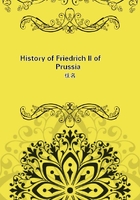
第51章 @@(28)
Perkin Warbeck, POST-MORTEM Richard II., Dimitri of Russia, Martin Guerre of the CAUSES CELEBRES: it is a common story in the world, and needs no commentary now. POST-MORTEM Waldemar, it is said, was a Miller's Man, "of the name of Jakob Rehback;" who used to be about the real Waldemar in a menial capacity, and had some resemblance to him. He showed signets, recounted experiences, which had belonged to the real Waldemar. Many believed in his pretension, and took arms to assert it; the Reich being in much internal battle at the time; poor Kaiser Ludwig, with his Avignon Popes and angry Kings Johann, wading in deep waters. Especially the disaffected Cousinry, or Princes of Anhalt, believed and battled for POST-MORTEM Waldemar; who were thought to have got him up from the first. Kurfurst Ludwig had four or five most sad years with him;--all the worse when the PFAFFEN-KAISER (King Johann's son) came on the stage, in the course of them (A.D. 1346), and Kaiser Ludwig, yielding not indeed to him, but to Death, vanished from it two years after; [Elected, 1314; Muhldorf, and Election COMPLETE, 1322; died, 1347, age 60.] leaving Kurfurst Ludwig to his own shifts with the Pfaffen-Kaiser. Whom he could not now hinder from succeeding to the Reich. He tried hard; set up, he and others, an Anti-Kaiser (GUNTHER OF SCHWARTZBURG, temporary Anti-Kaiser, whom English readers can forget again): he bustled, battled, negotiated, up and down; and ran across, at one time, to Preussen to the Teutsch Ritters,--presumably to borrow money:--but it all would not do. The Pfaffen-Kaiser carried it, in the Diet and out of the Diet: Karl IV. by title; a sorry enough Kaiser, and by nature an enemy of Ludwig's.
It was in this whirl of intricate misventures that Kurfurst Ludwig had to deal with his False Waldemar, conjured from the deeps upon him, like a new goblin, where already there were plenty, in the dance round poor Ludwig. Of which nearly inextricable goblin-dance; threatening Brandenburg, for one thing, with annihilation, and yet leading Brandenburg abstrusely towards new birth and higher destinies,--how will it be possible (without raising new ghosts, in a sense) to give readers any intelligible notion?--Here, flickering on the edge of conflagration after duty done, is a poor Note which perhaps the reader had better, at the risk of superfluity, still in part take along with him:--"Kaiser Henry VII., who died of sacramental wine, First of the Luxemburg Kaisers, left Johann still a boy of fifteen, who could not become the second of them, but did in time produce the Second, who again produced the Third and Fourth.
"Johann was already King of Bohemia; the important young gentleman, Ottocar's grandson, whom we saw 'murdered at Olmutz none yet knows by whom,' had left that throne vacant, and it lapsed to the Kaiser; who, the Nation also favoring, duly put in his son Johann. There was a competitor, 'Duke of the Tyrol,' who claimed on loose grounds; 'My wife was Aunt of the young murdered King,' said he; 'wherefore'--! Kaiser, and Johann after him, rebutted this competitor; but he long gave some trouble, having great wealth and means. He produced a Daughter, Margaret Heiress of the Tyrol,--with a terrible MOUTH to her face, and none of the gentlest hearts in her body:--that was perhaps his principal feat in the world. He died 1331; had styled himself 'King of Bohemia'
for twenty years,--ever since 1308;--but in the last two years of his life he gave it up, and ceased from troubling, having come to a beautiful agreement with Johann.
"Johann, namely, wedded his eldest Son to this competitor's fine Daughter with the mouth (Year 1329): 'In this manner do not Bohemia and the Tyrol come together in my blood and in yours, and both of us are made men?' said the two contracting parties.--Alas, no: the competitor Duke, father of the Bride, died some two years after, probably with diminished hopes of it; and King Johann lived to see the hope expire dismally altogether. There came no children, there came no--In fact Margaret, after a dozen years of wedlock, in unpleasant circumstances, broke it off as if by explosion; took herself and her Tyrol irrevocably over to Kaiser Ludwig, quite away from King Johann,--who, his hopes of the Tyrol expiring in such dismal manner, was thenceforth the bitter enemy of Ludwig and what held of him."Tyrol explosion was in 1342. And now, keeping these preliminary dates and outlines in mind, we shall understand the big-mouthed Lady better, and the consequences of her in the world.
MARGARET WITH THE POUCH-MOUTH.
What principally raised this dance of the devils round poor Ludwig, I perceive, was a marriage he had made, three years before Waldemar emerged; of which, were it only for the sake of the Bride's name, some mention is permissible. Margaret of the Tyrol, commonly called, by contemporaries and posterity, MAULTASCHE(Mouthpoke, Pocket-mouth), she was the bride:--marriage done at Innspruck, 1342, under furtherance of father Ludwig the Kaiser:--such a mouth as we can fancy, and a character corresponding to it.
This, which seemed to the two Ludwigs a very conquest of the golden-fleece under conditions, proved the beginning of their worst days to both of them.